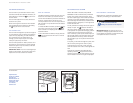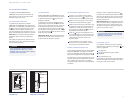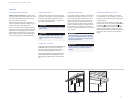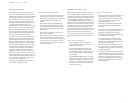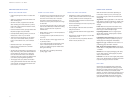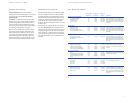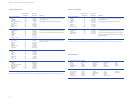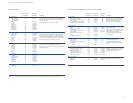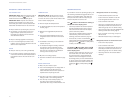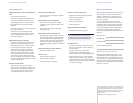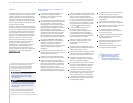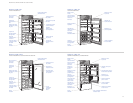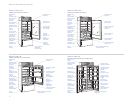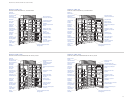
18
FRESH VEGETABLES
Recommended
Temperature
Storage Life
(refrigerator)
Comments
FRESH VEGETABLES
anise
a
rtichokes
asparagus
b
eans, green/snap/lima*
bean sprouts
beets
belgian endive
bok choy
1–2˚C
1
˚C
1–2˚C
4
–7˚C
1˚C
1˚C
2–3˚C
1˚C
2–3 weeks
1
–2 weeks
2–3 weeks
7
–10 days
7–9 days
3–4 months
2–4 weeks
3 weeks
Wash vegetables in cool water and drain. Store in airtight con-
t
ainer or plastic wrap.
Most vegetables should be stored inhigher humidity.
broccoli
brussels sprouts
cabbage
carrots
cauliflower
c
eleriac
celery
chinese broccoli
1˚C
1˚C
1˚C
1˚C
1˚C
1
˚C
1˚C
1˚C
1–2 weeks
3–5 weeks
3–6 weeks
1–5 months
3–4 weeks
6
–8 months
1–2 months
10–14 days
Discard any fresh vegetables that are moldy or have other
signs of spoilage and wipe out the refrigerator compartment.
For fresh-cutproduce,follow storage directions on package.
chinese cabbage
corn, sweet
cucumbers*
d
aikon
eggplant*
endive/escarole
garlic
horseradish
1˚C
1˚C
7˚C
1
˚C
7˚C
1˚C
1˚C
1˚C
2–3 months
5–8 days
10–14 days
4
months
1–2 weeks
2–3 weeks
6–7 months
10–12 months
R
efer to the list of ethylene sensitive and ethylene producing
vegetables andfruits.
jerusalem artichokes
kale
kohlrabi
leeks
lettuce
mushrooms
okra*
onions, bulb
1˚C
1˚C
1˚C
1˚C
1˚C
1˚C
7˚C
1˚C
1–2 weeks
1–2 months
10–14 days
2 months
2–3 weeks
1–2 weeks
1–2 weeks
1–6 months
onions, green
parsley
parsnips
peas, pods and shelled
peppers, bell*
peppers, chile
pumpkins*
radicchio
1˚C
1˚C
1˚C
1˚C
7˚C
7˚C
3–7˚C
1˚C
7–10 days
1–2 months
4–5 months
1–2 weeks
2–3 weeks
2–3 weeks
3–4 months
2–3 weeks
*Sensitive tochill injury, a cause of spoilage. Damage may not beapparent untilthe vegetable is returned to awarmer temperature.
NOTE: See foodpreservation guide forcomplete instructionson freezing vegetables. Recommended freezer storage temperature is -18˚C.
FRESH VEGETABLES
ETHYLENE GAS
Recommended
Temperature
Storage Life
(refrigerator)
Comments
F
RESH VEGETABLES
radishes
romaine
rutabagas
salsify
s
hallots
snow peas
spinach
squash, summer*
1˚C
1˚C
1˚C
1˚C
1
˚C
1˚C
1˚C
4–7˚C
1–2 months
2–3 weeks
4–6 months
2–4 months
6
months
1–2 weeks
10–14 days
1–2 weeks
Wash vegetables in cool water and drain. Store in airtight con-
tainer or plastic wrap.
M
ost vegetablesshould be stored in higherhumidity.
tamarillos
t
omatoes (ripe)
turnips
water chestnuts
w
atercress
3–4˚C
8
–10˚C
1˚C
1–2˚C
1
˚C
10 weeks
1
–3 weeks
4–5 months
2–4 months
2
–3 weeks
D
iscard any fresh vegetables that are moldy or have other
signs of spoilage and wipeout the refrigerator compartment.
For fresh-cutproduce,follow storage directions on package.
R
efer to the list of ethylene sensitive and ethylene producing
vegetables andfruits.
*Sensitive tochill injury, a cause of spoilage. Damage may not beapparent until the vegetable is returned to a warmer temperature.
NOTE: See foodpreservation guide forcomplete instructions on freezing vegetables. Recommendedfreezer storagetemperature is -18˚C.
ETHYLENE PRODUCING FOODS
apples
apricots
avocados
ripening bananas
cantaloupe
cherimoyas
figs
guavas
honeydew
kiwifruit
mamey sapote
mangoes
mangosteen
nectarines
papayas
passion fruit
peaches
pears
persimmons
plantains
plums
prunes
quince
tomatoes
ETHYLENE SENSITIVE FOODS
unripe bananas
green beans
belgian endive
broccoli
brussels sprouts
cabbage
carrots
cauliflower
chard
cucumbers
eggplant
unripe kiwifruit
leafy greens
lettuce
okra
peas
peppers
spinach
squash
sweet potatoes
watercress
watermelon
NOTE: Donot store ethylene producingfoodswith ethylene sensitive foods.
FOOD STORAGE RECOMMENDATIONS



